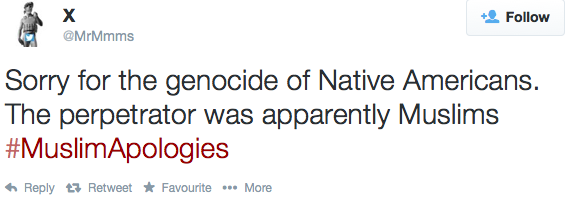A week ago I came across #MuslimApologies, a hashtag that aimed to respond to the idea that we, Muslims as a collective, have some kind of responsibility to apologize for the actions of extremists and violent movements such as ISIS, Al-Qaeda, etc. The Washington Post picked up the story showing that #MuslimApologies is just another demonstration of Muslim’s frustration over the issue of “collective responsibility.”
Vox located the hashtag in the context of a wider social media movement to counter the idea that Muslims are a homogenous, well-contained group that acts as one. They argue, along with BBC, that the hashtag emerges from #NotInMyName, another hashtag that aimed to counter ISIS’s actions and the idea that Muslims had some kind of responsibility in the matter.
I personally found the hashtag quite interesting. After seeing numerous articles in my Facebook feed “explaining” how ISIS, and other extremists, are not “Islamic,” not “real” Muslims or simply not representative of the rest of us (here, here and here), I was frustrated. It is not that I do not believe that we should not raise voices against extremism, violence and oppression, or that I, by any means support ISIS, but I wondered, why me?
Since my conversion to Islam I have found that I have had to give explanations about pretty much everything I do (even things I did before I was Muslim). Why do(n’t) I eat halal? Why do(n’t) I wear hijab? Why do(n’t) I identify as a feminist? Whereas I understand the curiosity, I see a broader notion that Muslim=Muslims in the popular imagination of some non-Muslim communities. Sometimes we feel compelled to respond and distance ourselves from extremist groups as a way to stop the circles of Islamophobia that some of us have experienced. However, I wonder if giving constant explanations and apologizing for what others do actually prevents Islamophobic behaviours or even diminishes them?
We have gone through this before. (Some) Muslims say one thing; (some) non-Muslims counter this through either Islamophobic articles (a recent one compares ISIS and Muslims to the Inquisition and Catholics, but it is hate speech, so I won’t share), epistemic violence (“we” know better than “you” about “you,” the attitude some conservatives and ex-Muslims have taken) or simple disregard (ISIS is Islamic, period).
#MuslimApologies was both interesting and hilarious as a way to say that we have nothing to apologize for collectively, and also to show Twitter followers that there are tons of things they do not know about Islam, Muslims and everything in between.
Muslim women engaged broadly with the hashtag, not only sarcastically showing the paradoxes of Islamophobia and depictions of Islam in Western media, but also making a point of showing that while some Muslim women, as in other communities, suffer under patriarchal societies, they do not all fit neatly into the silent, obedient, and passive victim mould.
Whereas famous women like Lauren Booth participated in the twitter trend, some of my favorite tweets come from bloggers, social media hipsters and just “regular” Muslims. Contributors “apologized” for anti-usury rules in Islamic texts, the first university in the world, anti-racism movements and the lack of bad hair days.

However, some tweets also took a gendered dimension. Along with those Muslim women who reminded us about history and social justice, some Muslims felt the need to make it all about hijab, modesty and the “hiding our women” attitude (eyeroll).
Some other displays of ignorance included making comments like: “We are sorry but Muslims were already in mainland America before Columbus. This land belongs to us!!! but you can stay.” As I pointed out, this completely obliterates Indigenous peoples like me (eye roll again), and this last tweet was later deleted.
Another tweet sarcartically apologizes for the Native American genocide:
As an Indigenous woman I find the #SorryNotSorry aspect of this sarcastic humor problematic. For example, I would point out that Muslims like others have benefited from the dispossesion of Indigenous peoples, without necessarily being aware of the history, with some of the first settlements of Muslim and Arab immigrants in Canada being in Saskatchewan and Manitoba. Whose land was that?
But once again, we are not a homogenous group. Muslims and Muslim women are individuals that do not share culture, language, education and not even religious practices or rituals…so unfortunately, I can’t apologize for those Muslims who think different than me.
Sorry for not being able to apologize and sorry for being a proud Indigenous Muslim woman #MuslimApologies.







